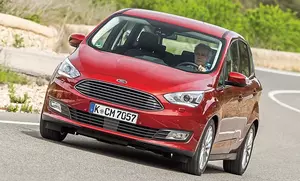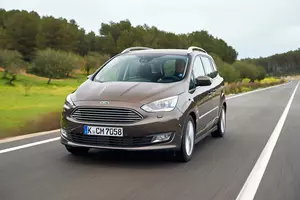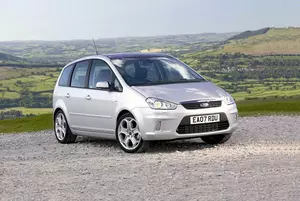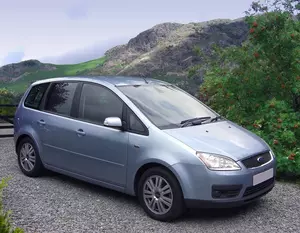
| Vehicle | Curb weight | Difference from world's smallest | Weight to power ratio | 0—60 mph acceleration ratio | Consumption ratio |
|---|---|---|---|---|---|
| 1.0 EcoBoost |
1391 kg / 3067 lbs |
966 kg (2130 lbs) heavier | 14 kg to 1 hp | 113 kg/s (249 lbs/s) |
273 kg/L (602 lbs/L) |
| 1.5 EcoBoost |
1413 kg / 3116 lbs |
988 kg (2179 lbs) heavier | 9 kg to 1 hp | 146 kg/s (322 lbs/s) |
217 kg/L (478 lbs/L) |
| 1.6 Ti-VCT |
1374 kg / 3030 lbs |
949 kg (2093 lbs) heavier | 16 kg to 1 hp | 91 kg/s (201 lbs/s) |
215 kg/L (474 lbs/L) |
| 1.5 TDCi |
1472 kg / 3246 lbs |
1047 kg (2309 lbs) heavier | 12 kg to 1 hp | 125 kg/s (276 lbs/s) |
335 kg/L (739 lbs/L) |
| 2.0 TDCi |
1519 kg / 3349 lbs |
1094 kg (2412 lbs) heavier | 9 kg to 1 hp | 188 kg/s (415 lbs/s) |
316 kg/L (697 lbs/L) |
| 1.6 TDCi |
1390 kg / 3065 lbs |
965 kg (2128 lbs) heavier | 12 kg to 1 hp | 130 kg/s (287 lbs/s) |
309 kg/L (681 lbs/L) |
| 1.5 ECOnetic |
1330 kg / 2933 lbs |
905 kg (1996 lbs) heavier | 13 kg to 1 hp | 116 kg/s (256 lbs/s) |
350 kg/L (772 lbs/L) |
| 2.0 |
1769 kg / 3901 lbs |
1344 kg (2964 lbs) heavier | 13 kg to 1 hp | - |
285 kg/L (628 lbs/L) |
| Vehicle | 1.0 EcoBoost |
|---|---|
| Curb weight |
1391 kg / 3067 lbs |
| Difference from world's smallest | 966 kg (966 lbs) heavier |
| Weight to power ratio | 14 kg to 1 hp |
| 0—60 mph acceleration ratio | 113 kg/s (249 lbs/s) |
| Consumption ratio |
273 kg/L (602 lbs/L) |
| Vehicle | 1.5 EcoBoost |
| Curb weight |
1413 kg / 3116 lbs |
| Difference from world's smallest | 988 kg (988 lbs) heavier |
| Weight to power ratio | 9 kg to 1 hp |
| 0—60 mph acceleration ratio | 146 kg/s (322 lbs/s) |
| Consumption ratio |
217 kg/L (478 lbs/L) |
| Vehicle | 1.6 Ti-VCT |
| Curb weight |
1374 kg / 3030 lbs |
| Difference from world's smallest | 949 kg (949 lbs) heavier |
| Weight to power ratio | 16 kg to 1 hp |
| 0—60 mph acceleration ratio | 91 kg/s (201 lbs/s) |
| Consumption ratio |
215 kg/L (474 lbs/L) |
| Vehicle | 1.5 TDCi |
| Curb weight |
1472 kg / 3246 lbs |
| Difference from world's smallest | 1047 kg (1047 lbs) heavier |
| Weight to power ratio | 12 kg to 1 hp |
| 0—60 mph acceleration ratio | 125 kg/s (276 lbs/s) |
| Consumption ratio |
335 kg/L (739 lbs/L) |
| Vehicle | 2.0 TDCi |
| Curb weight |
1519 kg / 3349 lbs |
| Difference from world's smallest | 1094 kg (1094 lbs) heavier |
| Weight to power ratio | 9 kg to 1 hp |
| 0—60 mph acceleration ratio | 188 kg/s (415 lbs/s) |
| Consumption ratio |
316 kg/L (697 lbs/L) |
| Vehicle | 1.6 TDCi |
| Curb weight |
1390 kg / 3065 lbs |
| Difference from world's smallest | 965 kg (965 lbs) heavier |
| Weight to power ratio | 12 kg to 1 hp |
| 0—60 mph acceleration ratio | 130 kg/s (287 lbs/s) |
| Consumption ratio |
309 kg/L (681 lbs/L) |
| Vehicle | 1.5 ECOnetic |
| Curb weight |
1330 kg / 2933 lbs |
| Difference from world's smallest | 905 kg (905 lbs) heavier |
| Weight to power ratio | 13 kg to 1 hp |
| 0—60 mph acceleration ratio | 116 kg/s (256 lbs/s) |
| Consumption ratio |
350 kg/L (772 lbs/L) |
| Vehicle | 2.0 |
| Curb weight |
1769 kg / 3901 lbs |
| Difference from world's smallest | 1344 kg (1344 lbs) heavier |
| Weight to power ratio | 13 kg to 1 hp |
| 0—60 mph acceleration ratio | - |
| Consumption ratio |
285 kg/L (628 lbs/L) |

| Vehicle | Curb weight | Difference from world's smallest | Weight to power ratio | 0—60 mph acceleration ratio | Consumption ratio |
|---|---|---|---|---|---|
| 1.0 EcoBoost |
1493 kg / 3292 lbs |
1068 kg (2355 lbs) heavier | 12 kg to 1 hp | 128 kg/s (282 lbs/s) |
287 kg/L (633 lbs/L) |
| 1.5 EcoBoost |
1507 kg / 3323 lbs |
1082 kg (2386 lbs) heavier | 8 kg to 1 hp | 167 kg/s (368 lbs/s) |
222 kg/L (490 lbs/L) |
| 1.6 Ti-VCT |
1477 kg / 3257 lbs |
1052 kg (2320 lbs) heavier | 12 kg to 1 hp | 126 kg/s (278 lbs/s) |
220 kg/L (485 lbs/L) |
| 1.5 TDCi |
1501 kg / 3310 lbs |
1076 kg (2373 lbs) heavier | 13 kg to 1 hp | 128 kg/s (282 lbs/s) |
341 kg/L (752 lbs/L) |
| 1.6 TDCi |
1504 kg / 3316 lbs |
1079 kg (2379 lbs) heavier | 13 kg to 1 hp | 129 kg/s (284 lbs/s) |
307 kg/L (677 lbs/L) |
| 2.0 TDCi |
1605 kg / 3539 lbs |
1180 kg (2602 lbs) heavier | 9 kg to 1 hp | 191 kg/s (421 lbs/s) |
321 kg/L (708 lbs/L) |
| Vehicle | 1.0 EcoBoost |
|---|---|
| Curb weight |
1493 kg / 3292 lbs |
| Difference from world's smallest | 1068 kg (1068 lbs) heavier |
| Weight to power ratio | 12 kg to 1 hp |
| 0—60 mph acceleration ratio | 128 kg/s (282 lbs/s) |
| Consumption ratio |
287 kg/L (633 lbs/L) |
| Vehicle | 1.5 EcoBoost |
| Curb weight |
1507 kg / 3323 lbs |
| Difference from world's smallest | 1082 kg (1082 lbs) heavier |
| Weight to power ratio | 8 kg to 1 hp |
| 0—60 mph acceleration ratio | 167 kg/s (368 lbs/s) |
| Consumption ratio |
222 kg/L (490 lbs/L) |
| Vehicle | 1.6 Ti-VCT |
| Curb weight |
1477 kg / 3257 lbs |
| Difference from world's smallest | 1052 kg (1052 lbs) heavier |
| Weight to power ratio | 12 kg to 1 hp |
| 0—60 mph acceleration ratio | 126 kg/s (278 lbs/s) |
| Consumption ratio |
220 kg/L (485 lbs/L) |
| Vehicle | 1.5 TDCi |
| Curb weight |
1501 kg / 3310 lbs |
| Difference from world's smallest | 1076 kg (1076 lbs) heavier |
| Weight to power ratio | 13 kg to 1 hp |
| 0—60 mph acceleration ratio | 128 kg/s (282 lbs/s) |
| Consumption ratio |
341 kg/L (752 lbs/L) |
| Vehicle | 1.6 TDCi |
| Curb weight |
1504 kg / 3316 lbs |
| Difference from world's smallest | 1079 kg (1079 lbs) heavier |
| Weight to power ratio | 13 kg to 1 hp |
| 0—60 mph acceleration ratio | 129 kg/s (284 lbs/s) |
| Consumption ratio |
307 kg/L (677 lbs/L) |
| Vehicle | 2.0 TDCi |
| Curb weight |
1605 kg / 3539 lbs |
| Difference from world's smallest | 1180 kg (1180 lbs) heavier |
| Weight to power ratio | 9 kg to 1 hp |
| 0—60 mph acceleration ratio | 191 kg/s (421 lbs/s) |
| Consumption ratio |
321 kg/L (708 lbs/L) |

| Vehicle | Curb weight | Difference from world's smallest | Weight to power ratio | 0—60 mph acceleration ratio | Consumption ratio |
|---|---|---|---|---|---|
| 1.0 EcoBoost |
1391 kg / 3067 lbs |
966 kg (2130 lbs) heavier | 11 kg to 1 hp | 129 kg/s (284 lbs/s) |
273 kg/L (602 lbs/L) |
| 1.6 Duratec Ti-VCT |
1374 kg / 3030 lbs |
949 kg (2093 lbs) heavier | 11 kg to 1 hp | 126 kg/s (278 lbs/s) |
215 kg/L (474 lbs/L) |
| 1.6 Duratorq TDCi |
1390 kg / 3065 lbs |
965 kg (2128 lbs) heavier | 12 kg to 1 hp | 130 kg/s (287 lbs/s) |
309 kg/L (681 lbs/L) |
| 2.0 Duratorq TDCi |
1550 kg / 3418 lbs |
1125 kg (2481 lbs) heavier | 10 kg to 1 hp | 176 kg/s (388 lbs/s) |
282 kg/L (622 lbs/L) |
| 1.6 EcoBoost SCTi |
1385 kg / 3054 lbs |
960 kg (2117 lbs) heavier | 9 kg to 1 hp | 156 kg/s (344 lbs/s) |
223 kg/L (492 lbs/L) |
| Vehicle | 1.0 EcoBoost |
|---|---|
| Curb weight |
1391 kg / 3067 lbs |
| Difference from world's smallest | 966 kg (966 lbs) heavier |
| Weight to power ratio | 11 kg to 1 hp |
| 0—60 mph acceleration ratio | 129 kg/s (284 lbs/s) |
| Consumption ratio |
273 kg/L (602 lbs/L) |
| Vehicle | 1.6 Duratec Ti-VCT |
| Curb weight |
1374 kg / 3030 lbs |
| Difference from world's smallest | 949 kg (949 lbs) heavier |
| Weight to power ratio | 11 kg to 1 hp |
| 0—60 mph acceleration ratio | 126 kg/s (278 lbs/s) |
| Consumption ratio |
215 kg/L (474 lbs/L) |
| Vehicle | 1.6 Duratorq TDCi |
| Curb weight |
1390 kg / 3065 lbs |
| Difference from world's smallest | 965 kg (965 lbs) heavier |
| Weight to power ratio | 12 kg to 1 hp |
| 0—60 mph acceleration ratio | 130 kg/s (287 lbs/s) |
| Consumption ratio |
309 kg/L (681 lbs/L) |
| Vehicle | 2.0 Duratorq TDCi |
| Curb weight |
1550 kg / 3418 lbs |
| Difference from world's smallest | 1125 kg (1125 lbs) heavier |
| Weight to power ratio | 10 kg to 1 hp |
| 0—60 mph acceleration ratio | 176 kg/s (388 lbs/s) |
| Consumption ratio |
282 kg/L (622 lbs/L) |
| Vehicle | 1.6 EcoBoost SCTi |
| Curb weight |
1385 kg / 3054 lbs |
| Difference from world's smallest | 960 kg (960 lbs) heavier |
| Weight to power ratio | 9 kg to 1 hp |
| 0—60 mph acceleration ratio | 156 kg/s (344 lbs/s) |
| Consumption ratio |
223 kg/L (492 lbs/L) |

| Vehicle | Curb weight | Difference from world's smallest | Weight to power ratio | 0—60 mph acceleration ratio | Consumption ratio |
|---|---|---|---|---|---|
| 1.0 EcoBoost |
1493 kg / 3292 lbs |
1068 kg (2355 lbs) heavier | 12 kg to 1 hp | 129 kg/s (284 lbs/s) |
287 kg/L (633 lbs/L) |
| 1.6 Duratorq TDCi |
1504 kg / 3316 lbs |
1079 kg (2379 lbs) heavier | 13 kg to 1 hp | 129 kg/s (284 lbs/s) |
320 kg/L (706 lbs/L) |
| 1.6 Duratec Ti-VCT |
1477 kg / 3257 lbs |
1052 kg (2320 lbs) heavier | 12 kg to 1 hp | 136 kg/s (300 lbs/s) |
220 kg/L (485 lbs/L) |
| 2.0 Duratorq TDCi |
1634 kg / 3603 lbs |
1209 kg (2666 lbs) heavier | 10 kg to 1 hp | 176 kg/s (388 lbs/s) |
287 kg/L (633 lbs/L) |
| 1.6 EcoBoost SCTi |
1496 kg / 3299 lbs |
1071 kg (2362 lbs) heavier | 10 kg to 1 hp | 168 kg/s (370 lbs/s) |
234 kg/L (516 lbs/L) |
| Vehicle | 1.0 EcoBoost |
|---|---|
| Curb weight |
1493 kg / 3292 lbs |
| Difference from world's smallest | 1068 kg (1068 lbs) heavier |
| Weight to power ratio | 12 kg to 1 hp |
| 0—60 mph acceleration ratio | 129 kg/s (284 lbs/s) |
| Consumption ratio |
287 kg/L (633 lbs/L) |
| Vehicle | 1.6 Duratorq TDCi |
| Curb weight |
1504 kg / 3316 lbs |
| Difference from world's smallest | 1079 kg (1079 lbs) heavier |
| Weight to power ratio | 13 kg to 1 hp |
| 0—60 mph acceleration ratio | 129 kg/s (284 lbs/s) |
| Consumption ratio |
320 kg/L (706 lbs/L) |
| Vehicle | 1.6 Duratec Ti-VCT |
| Curb weight |
1477 kg / 3257 lbs |
| Difference from world's smallest | 1052 kg (1052 lbs) heavier |
| Weight to power ratio | 12 kg to 1 hp |
| 0—60 mph acceleration ratio | 136 kg/s (300 lbs/s) |
| Consumption ratio |
220 kg/L (485 lbs/L) |
| Vehicle | 2.0 Duratorq TDCi |
| Curb weight |
1634 kg / 3603 lbs |
| Difference from world's smallest | 1209 kg (1209 lbs) heavier |
| Weight to power ratio | 10 kg to 1 hp |
| 0—60 mph acceleration ratio | 176 kg/s (388 lbs/s) |
| Consumption ratio |
287 kg/L (633 lbs/L) |
| Vehicle | 1.6 EcoBoost SCTi |
| Curb weight |
1496 kg / 3299 lbs |
| Difference from world's smallest | 1071 kg (1071 lbs) heavier |
| Weight to power ratio | 10 kg to 1 hp |
| 0—60 mph acceleration ratio | 168 kg/s (370 lbs/s) |
| Consumption ratio |
234 kg/L (516 lbs/L) |

| Vehicle | Curb weight | Difference from world's smallest | Weight to power ratio | 0—60 mph acceleration ratio | Consumption ratio |
|---|---|---|---|---|---|
| 2.0 16V |
1441 kg / 3177 lbs |
1016 kg (2240 lbs) heavier | 10 kg to 1 hp | 155 kg/s (342 lbs/s) |
197 kg/L (434 lbs/L) |
| 1.8 16V |
1409 kg / 3107 lbs |
984 kg (2170 lbs) heavier | 11 kg to 1 hp | 137 kg/s (302 lbs/s) |
198 kg/L (437 lbs/L) |
| 1.6 16V |
1344 kg / 2964 lbs |
919 kg (2027 lbs) heavier | 13 kg to 1 hp | 109 kg/s (240 lbs/s) |
195 kg/L (430 lbs/L) |
| 2.0 TDCI |
1506 kg / 3321 lbs |
1081 kg (2384 lbs) heavier | 11 kg to 1 hp | 165 kg/s (364 lbs/s) |
260 kg/L (573 lbs/L) |
| Vehicle | 2.0 16V |
|---|---|
| Curb weight |
1441 kg / 3177 lbs |
| Difference from world's smallest | 1016 kg (1016 lbs) heavier |
| Weight to power ratio | 10 kg to 1 hp |
| 0—60 mph acceleration ratio | 155 kg/s (342 lbs/s) |
| Consumption ratio |
197 kg/L (434 lbs/L) |
| Vehicle | 1.8 16V |
| Curb weight |
1409 kg / 3107 lbs |
| Difference from world's smallest | 984 kg (984 lbs) heavier |
| Weight to power ratio | 11 kg to 1 hp |
| 0—60 mph acceleration ratio | 137 kg/s (302 lbs/s) |
| Consumption ratio |
198 kg/L (437 lbs/L) |
| Vehicle | 1.6 16V |
| Curb weight |
1344 kg / 2964 lbs |
| Difference from world's smallest | 919 kg (919 lbs) heavier |
| Weight to power ratio | 13 kg to 1 hp |
| 0—60 mph acceleration ratio | 109 kg/s (240 lbs/s) |
| Consumption ratio |
195 kg/L (430 lbs/L) |
| Vehicle | 2.0 TDCI |
| Curb weight |
1506 kg / 3321 lbs |
| Difference from world's smallest | 1081 kg (1081 lbs) heavier |
| Weight to power ratio | 11 kg to 1 hp |
| 0—60 mph acceleration ratio | 165 kg/s (364 lbs/s) |
| Consumption ratio |
260 kg/L (573 lbs/L) |

| Vehicle | Curb weight | Difference from world's smallest | Weight to power ratio | 0—60 mph acceleration ratio | Consumption ratio |
|---|---|---|---|---|---|
| 1.8 16V |
1287 kg / 2838 lbs |
862 kg (1901 lbs) heavier | 11 kg to 1 hp | 125 kg/s (276 lbs/s) |
181 kg/L (399 lbs/L) |
| 1.6 TDCi |
1292 kg / 2849 lbs |
867 kg (1912 lbs) heavier | 12 kg to 1 hp | 121 kg/s (267 lbs/s) |
264 kg/L (582 lbs/L) |
| 1.6 16V |
1223 kg / 2697 lbs |
798 kg (1760 lbs) heavier | 11 kg to 1 hp | 108 kg/s (238 lbs/s) |
185 kg/L (408 lbs/L) |
| 2.0 16V |
1294 kg / 2853 lbs |
869 kg (1916 lbs) heavier | 9 kg to 1 hp | 139 kg/s (306 lbs/s) |
177 kg/L (390 lbs/L) |
| 2.0 TDCi |
1391 kg / 3067 lbs |
966 kg (2130 lbs) heavier | 10 kg to 1 hp | 153 kg/s (337 lbs/s) |
248 kg/L (547 lbs/L) |
| Vehicle | 1.8 16V |
|---|---|
| Curb weight |
1287 kg / 2838 lbs |
| Difference from world's smallest | 862 kg (862 lbs) heavier |
| Weight to power ratio | 11 kg to 1 hp |
| 0—60 mph acceleration ratio | 125 kg/s (276 lbs/s) |
| Consumption ratio |
181 kg/L (399 lbs/L) |
| Vehicle | 1.6 TDCi |
| Curb weight |
1292 kg / 2849 lbs |
| Difference from world's smallest | 867 kg (867 lbs) heavier |
| Weight to power ratio | 12 kg to 1 hp |
| 0—60 mph acceleration ratio | 121 kg/s (267 lbs/s) |
| Consumption ratio |
264 kg/L (582 lbs/L) |
| Vehicle | 1.6 16V |
| Curb weight |
1223 kg / 2697 lbs |
| Difference from world's smallest | 798 kg (798 lbs) heavier |
| Weight to power ratio | 11 kg to 1 hp |
| 0—60 mph acceleration ratio | 108 kg/s (238 lbs/s) |
| Consumption ratio |
185 kg/L (408 lbs/L) |
| Vehicle | 2.0 16V |
| Curb weight |
1294 kg / 2853 lbs |
| Difference from world's smallest | 869 kg (869 lbs) heavier |
| Weight to power ratio | 9 kg to 1 hp |
| 0—60 mph acceleration ratio | 139 kg/s (306 lbs/s) |
| Consumption ratio |
177 kg/L (390 lbs/L) |
| Vehicle | 2.0 TDCi |
| Curb weight |
1391 kg / 3067 lbs |
| Difference from world's smallest | 966 kg (966 lbs) heavier |
| Weight to power ratio | 10 kg to 1 hp |
| 0—60 mph acceleration ratio | 153 kg/s (337 lbs/s) |
| Consumption ratio |
248 kg/L (547 lbs/L) |